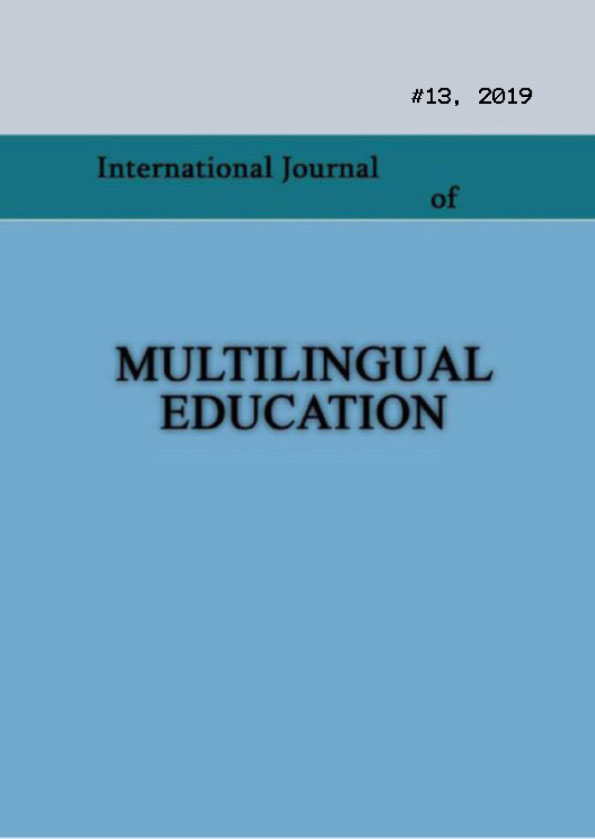Translation of the Batumi Linguocultural Digital Archive: The methodology of Glossing and Tagging Social, Political and Cultural Information in Translation of DRSP
Keywords:
translation methodology, glossing, tagging, Batumi Linguocultural Digital ArchiveAbstract
The Georgian dialects’ translation methodology (GDTM) for the digitized recorded speech patterns DRSP in the BalDAR was adopted for translation of the stratified language, which in this specific case is the Georgian dialect containing residues of Turkish, Persian, and Arabic, and Pontic Greek borrowings. However, GDTM can be extended as a general approach to the translation of other Georgian dialects into Standard English (SE) for the language documentation and archiving purposes. The justification for the Georgian Dialect Translation Methodology (GDTM) is that Batumi Linguocultural Digital Archive is a source of the cross-cultural validation of the Georgian and its dialects. The digitized, documented speech patterns contain many facts which are, at present, and will be in the future too, worth researching in various fields of study: Glossing and Tagging in translation can enhance the potential of the DigiArchive for the global research by the international scholars.
References
Dijk, 1977: Teun A. van Dijk, “Text and Context: Explorations in the Semantics and Pragmatics of Discourse”. London: Longman.
Tandaschwili, Khalvashi, Beridze, Khakhutaishvili, Tsetskhladze 2017: Manana Tandaschwili, Ramaz Khalvashi, Khatuna Beridze, Mzia Khakhutaishvili, Nana Tsetskhladze, Batumi Linguoculturological Digital Archive (contemporary Technological Achievements for the Database Arrangement of the Folklore Resources) TEMPUS International Journal of Multilingual Education. pp. 52 - 68;
Giorgadze, Abuladze, 2019: Giorgadze Marine, Abuladze Teona, “Diaspora and Migration Studies: Pontic Greeks in the Post Soviet Period”. Proceedings of the international conference: East European Multicultural Space - ISBN 978-9941-462-72-6.
Links:
The Armazi Project
http://armazi.uni-frankfurt.de/armaziII/enebi/kartuli/dialekt/acaruli.html
English-Norwegian Parallel Corpus: Manual Stig Johansson Jarle Ebeling Signe Oksefjell Department of British and American Studies University of Oslo, 1999/2002 https://www.hf.uio.no/ilos/english/services/knowledge-resources/omc/enpc/ENPCmanual.pdf Multilingual Education, journal http://www.multilingualeducation.org/en/article/37
Social Variation in Language, ch. 19; http://www.dsglynn.univ- paris8.fr/Yule_2014_The_Study_of_Language_Chpt19.pdf
The Leipzig Glossing Rules: https://www.eva.mpg.de/lingua/pdf/Glossing-Rules.pdf The Reichenau Glosses:
https://is.muni.cz/el/1421/podzim2008/LJMgrB23/um/texty/glosy_Reichenau.pdf The Scottish Corpus of Texts & Speech (SCOTS) http://www.helsinki.fi/varieng/CoRD/corpora/SCOTS/index.html
Scots Corpus https://www.scottishcorpus.ac.uk/
Published
How to Cite
Issue
Section
License

This work is licensed under a Creative Commons Attribution-NonCommercial 4.0 International License.
Copyright (c) - Authors who publish with this journal agree to the following terms: Authors retain copyright and grant the journal the right of first publication with the work simultaneously licensed under a Creative Commons Attribution-Noncommercial 4.0 International License, which allows others to share the work with an acknowledgement of the work's authorship and initial publication in this journal. Authors are permitted and encouraged to post their work online (e.g., in institutional repositories or on their personal website) prior to and during the submission process, as it can lead to productive exchanges, as well as earlier and greater citation of published work (see The Effect of Open Access). Authors may enter into separate, additional contractual arrangements for the non-exclusive distribution of the journal's published version of the work (e.g., post it to a repository or publish it in a book), with an acknowledgement of its initial publication in this journal.

